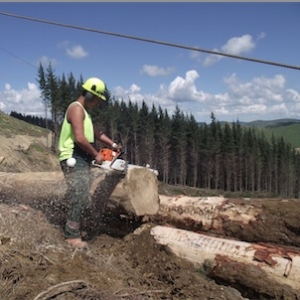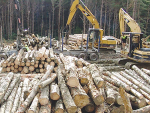TWO LYTTON High School students are eyeing a brighter future as they work towards achieving their primary industries VP awards.
Joe Gilvray, a Year 12 student at the Gisborne school, aspires to be in the forestry industry. As part of this, he has been working as a logger for Stewart Logging one day a week over the last two terms. This work will earn the year-12 student, credits toward his award.
"I was nervous at first," says Gilvray, "but now I love what I do and am more confident, although safety is very important and it is challenging work."
"I don't want it to stop here, I don't just want to be a logger, I want to be a manager."
After completing NCEA Level 2, Gilvray will be able to progress to year one of a two-year diploma in forestry management at Turanga Ararau, with the second year based at Waiariki Polytechnic in Rotorua.
"My uncle has been helping me learn about forestry and is one of my tutors," says Gilvray. His Mum who is an accountant and Dad who is a plumber are also supportive. "They know that I enjoy working outdoors and am good at managing that heavy machinery," he says.
Another Lytton School student Kelvin Bloem, is following in the footsteps of his Dad, who is a vineyard manager.
"What I am most interested in is making the grapes succeed – getting the best out of them and not wasting anything," says Bloem. "I am interested in sustainability."
Bloem says that it has been very useful getting to understand how a real work place operates. "I am learning about what employers want, who they want to employ and what they are looking for in their workers."
Bloem has being earning some of his sector-related credits at farm, DW Briant, which is managed by ex-Lytton student, Matt Fox.
Lytton's head of department for careers, Craig Wilkie says that the introduction of Vocational Pathways means that students are leaving with extra accreditation for the work they have done.
"We have been offering students a wide and appealing range of subjects for quite a long time, such as hospitality or hairdressing courses on site, as well as agriculture and forestry, but with a VP award students are cementing what they have learnt and are being recognised.
"What has helped make the pathways successful is our links into local industry and the relative ease with which we have been able to give students on-site sector experience."
Craig believes there is direct correlation between pathways and NCEA Level 2 and above achievement. "Students feel more successful because they get an accreditation and this spurs them on for further learning. Students are staying in school and are more focused."



















